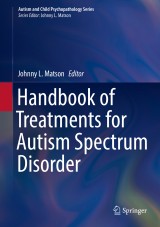Details

Handbook of Treatments for Autism Spectrum Disorder
Autism and Child Psychopathology Series
|
362,73 € |
|
| Verlag: | Springer |
| Format: | |
| Veröffentl.: | 03.10.2017 |
| ISBN/EAN: | 9783319617381 |
| Sprache: | englisch |
Dieses eBook enthält ein Wasserzeichen.
Beschreibungen
<div></div><div><p>This handbook provides a comprehensive review of the numerous factors associated with treatments for children, youth, and adults with autism spectrum disorder (ASD). It offers in-depth analysis of evidence-based treatments for young children, providing coverage on interventions within social skills training, school curricula, communication and speech training, and augmentative communication. It also covers treatments for adolescents and adults, including vocational programs, social integration programs, and mental health resources. Chapters also review several popular interventions such as functional behavior analysis, sensory integration therapy, early intensive behavioral interventions (EIBI), and floor time. In addition, the <i>Handbook</i> discusses standards of practice, focusing on ethical issues, review boards, training concerns, and informed consent.</p>Topics featured in the <i>Handbook </i>include:</div><div><ul><li>Training for parents of individuals diagnosed with ASD.<br></li><li>Treatment of socially reinforced problem behavior.<br></li><li>Comorbid challenging behaviors.<br></li><li>Post-secondary education supports and programs for adults.<br></li><li>The TEACCH Program for people with ASD.<br></li><li>Treatment of addiction in adults with ASD.<br></li><li>Diet and nutrition based treatments targeted at children with ASD.</li></ul><p></p><p> The <i>Handbook of Treatments for Autism Spectrum Disorder</i> is a must-have reference for researchers, clinicians/professionals, and graduate students in clinical child, school, and developmental psychology, child and adolescent psychiatry, and social work as well as rehabilitation medicine/therapy, behavioral therapy, pediatrics, and educational psychology. <br></p></div>
Chapter 1. Historical Development of Treatment.- Chapter 2. Substantiated and unsubstantiated Interventions for Individuals with ASD.- Chapter 3. Ethical Considerations Regarding Treatment.- Chapter 4. Institutional Review Boards and Standards.- Chapter 5. Informed Consent.- Chapter 6. The History, Pitfalls, and Promise of Licensure in the Field of Behavior Analysis.- Chapter 7. Staff Training.- Chapter 8. Parent Training for Parents of Individuals Diagnosed with Autism Spectrum Disorder.- Chapter 9. Treatment of Core Symptoms of Autism Spectrum Disorder.- Chapter 10. Comorbid Challenging Behavior.- Chapter 11. Treatment of Socially Reinforced Problem Behavior.- Chapter 12. Philosophy and Common Components of Early Intensive Behavioral Interventions.- Chapter 13. Additional Treatment Parameters and Issues Requiring Study: Early Intensive Behavioral Interventions (EIBI).- Chapter 14. Social Skills Training for Children and Adolescents with Autism Spectrum Disorder.- Chapter 15. Curriculums.- Chapter 16. Augmentative and Alternative Communication and Autism.- Chapter 17. Vocational Training for Persons with ASD.- Chapter 18. Supports for Post-Secondary Education.- Chapter 19. Sensory Integration Therapy and DIR/Floortime.- Chapter 20. Socialization Programs for Adults with ASD.- Chapter 21. Treatment of Addictions in Adults with Autism Spectrum Disorders.- Chapter 22. Diet and Supplementation Targeted for ASD.- Chapter 23. <b>Part 7. Evidence</b>-Based Psychological Treatment for Older Adolescents and Adults.- Chapter 23. The TEACCH Program for People with Autism Spectrum Disorder.- Chapter 24. Positive Behavior Support.- Chapter 25. Psychotropic Medications as Treatments for People with Autism Spectrum Disorder.- Chapter 26. Current Status and Future Directions.
<b>Johnny L. Matson, Ph.D.</b>, is Professor and Distinguished Research Master in the Department of Psychology, Louisiana State University (LSU), Baton Rouge, LA, USA. He is the author of over 800 publications including 41 books. Additionally, he is the founding editor of three journals; <i>Research in Autism Spectrum Disorders</i>, <i>Research in Developmental Disabilities</i> and the <i>Review Journal of Autism and Developmental Disorders</i>. His research focuses on the study of conditions that are comorbid with autism and/or intellectual disabilities.
<div><p>This handbook provides a comprehensive review of the numerous factors associated with treatments for children, youth, and adults with autism spectrum disorder (ASD). It offers in-depth analysis of evidence-based treatments for young children, providing coverage on interventions within social skills training, school curricula, communication and speech training, and augmentative communication. It also covers treatments for adolescents and adults, including vocational programs, social integration programs, and mental health resources. Chapters also review several popular interventions such as functional behavior analysis, sensory integration therapy, early intensive behavioral interventions (EIBI), and floor time. In addition, the <i>Handbook</i> discusses standards of practice, focusing on ethical issues, review boards, training concerns, and informed consent.</p>Topics featured in the <i>Handbook </i>include:</div><div><ul><li>Training for parents of individuals diagnosed with ASD.<br></li><li>Treatment of socially reinforced problem behavior.<br></li><li>Comorbid challenging behaviors.<br></li><li>Post-secondary education supports and programs for adults.<br></li><li>The TEACCH Program for people with ASD.<br></li><li>Treatment of addiction in adults with ASD.<br></li><li>Diet and nutrition based treatments targeted at children with ASD.</li></ul><p></p><p>The <i>Handbook of Treatments for Autism Spectrum Disorder</i> is a must-have reference for researchers, clinicians/professionals, and graduate students in clinical child, school, and developmental psychology, child and adolescent psychiatry, and social work as well as rehabilitation medicine/therapy, behavioral therapy, pediatrics, and educational psychology. </p></div><p></p>
Explores the factors associated with autism spectrum disorder (ASD) treatments Discusses significant advances made during the past decades in developing autism interventions Sets the stage for continued strides to be made in understanding and treating ASD Addresses issues relating to patient protection and treatment goals Comprehensively reviews evidence-based treatments for children, adolescents, and adults with ASD

















